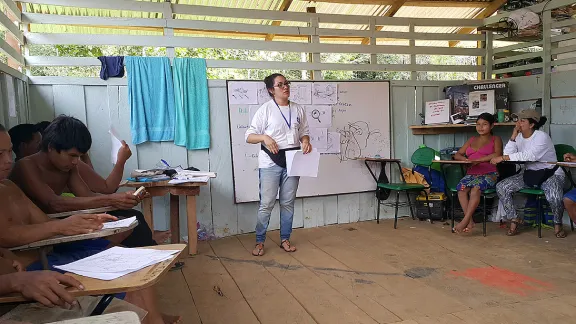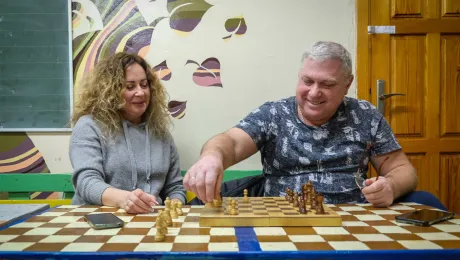
Yuri Guzman conducting a training session in Choco. She says humanitarian work allows her to offer solutions to the problems of people living in a conflict zone. Photo: LWF Colombia
Yuri Guzman, an environmental engineer working in a water, sanitation and social accompaniment project in Choco, Colombia, talks about what humanitarian work means to her.
Being an aid worker in Colombia has made me think about my life and compare it to other people, to learn from them and to understand them. It has also made me understand better the need for the presence of humanitarian workers in complex contexts such as the Colombian Pacific, where I am.
My commitment allows me to meet families, communities and organizations with different experiences. All of them survive in an environment of armed conflict in which there is also a high risk of natural disasters. Humanitarian work allows me to help these people, to assist them, and to contribute ideas, tools and solutions to their problems.
An important part of my work is to make sure that the human rights of these vulnerable people are respected. I want to make them visible and help them out of the stigmatization and marginalization in which they live.
Recurrent humanitarian crises, the absence of the state, the lack of adequate and structural needs of the population and their constant vulnerability are some of the most important challenges that humanitarian workers face every day in Colombia.
What encourages us are the tangible results when the projects we develop in a community are consistent with the cultural context and respond to the needs of the people - when individual and community capacities are strengthened and we see social change come about in the families.
It's important for me to understand communities. I want them to participate in decision-making processes and initiatives that affect them. This has increased the acceptance of our work because we facilitate their empowerment and help them take charge of their own destiny.
For me, living with Afro-descendent and indigenous communities, eating their food, living in the same conditions in which they live and being a direct and experiential witness of its location has been quite an experience personally and professionally. From my point of view, humanitarian work means providing new perspectives of life in solidarity. It means respecting diversity and defending human rights.


